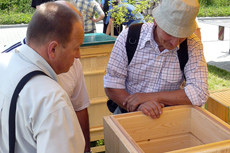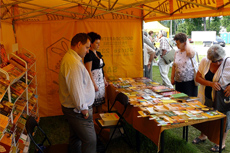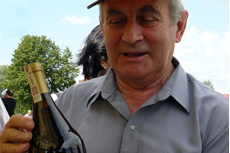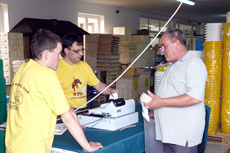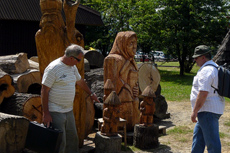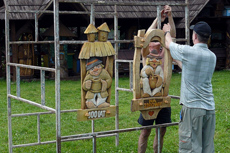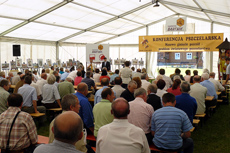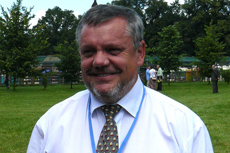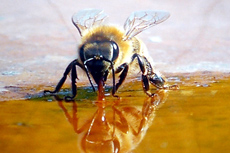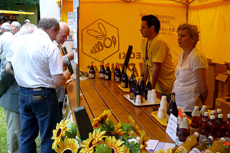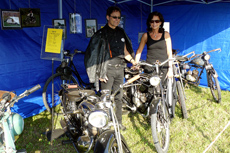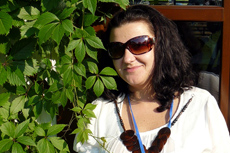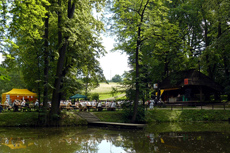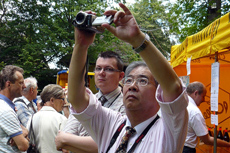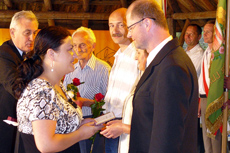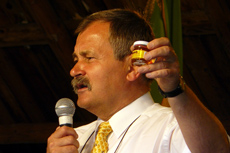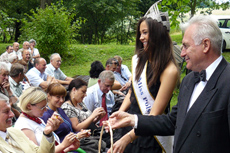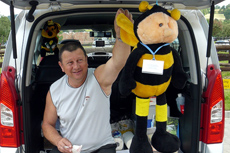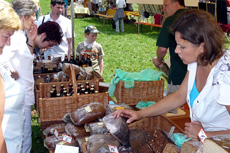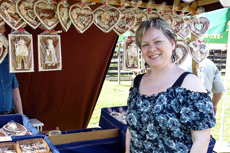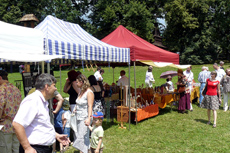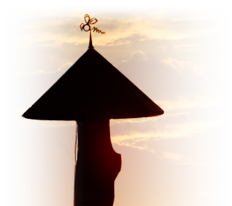For beekeepers, Biesiada is a perfect occasion not only to share their experience, broaden specialized knowledge, but also to socialize while tasting a variety of honey or indulging oneself with a glass of honey mead.
Interestingly enough, with every year there appears to be more and more consumers than producers. Amateurs of honey relish every opportunity to discover the flavours of the bee world and the beneficial properties of bee products such as flower pollen, propolis, bee milk and bee bread.
For the whole two days the stalls are packed with with a wide range of products that one can find literally indispensable for running a recreational apiary or a fully professional beekeeping farm.
There is not only beekeepeeing equipment but also a bulk of specialized literature, teaching films and richly edited albums describing the history, customs and the modern techniques of beekeeping today.
While considering starting one's own apiary and tasting honey mead, one can't help but to see the numerous advantages of having just a few bee families.
When someone took the chance and decided to try being a beekeeper they could buy something for a start offhand - a special package containing a bee queen and bee workers.
Since the decision has been made there's little to do do but to choose the right beehives, brood frames, smokers, protective hats and other necessary accessories.
From a few years now, Biesiada is accompanied by artistic performances. Just before every Besiada there are outdoor workshops in which painters, sculptors and caricaturists take part.
The fifth sculptor's outdoor workshop has resulted in a number of figural beehives and carvings, all relating to the theme of beekeeping.
Let's hear the opinion of the workshop participants (in Polish) (.mp3).
Every Besiada i preceded by a beekeeping conference devoted to the current problems of beekeeping. It is the obligatory part of the program without which the Besiada could not be even organized.
This year conference related to the sudden and serious phenomenon of CCD (Colony Collapse Disorder) that was first noticed in the USA ate the end of 19th century. As back then there were only a few episodes it was considered to be a kind of freak of nature. However, the phenomenon returned to the USA and Canada four years ago but this time with an overwhelming force. It resulted in elimination of even 90% of bee population in some regions and in enormous loss in beekeeping economy. It was then called - Colony Collapse Disorder. The beekeepers and scientists present at the Besiada discussed the possibility of a similar situation in Poland and Europe.
So far, CCD has not been confirmed to be the new disease present among insects. However,it is associated with a number of negative factors: a widespread usage of pesticides, plantations of genetically modified plants, environmental contamination, climate changes and other bee diseases, in particular Varroe destructor.
Italians were the first to decisively say 'no' to pesticides used at corn plantations. As a result, two years ago some chemicals for plant protection were banned.
According to the Italian calculations from two years back the loss of apiaries caused by pesticides reached the amount of 30 ml Euro. Another 20 ml was the estimated loss in reduced honey and bee products acquisition. However, the most shocking is the sum of 250 ml that presumably was to be lost by Italian agriculture as a result of lack of plants pollination.
Those drastic measures has already shown some positive effects and Italian apiaries are still in the process of recovery. Polish beekeepers hope that such decisive actions will be soon taken by the Polish government. According to the European regulation that is supposed to prevent using plants protective chemicals in agriculture but it needs to be followed what is still quite troublesome since the producers of these chemicals are influential concerns and corporations.
Dr Krystyna Pohorecką and prof. Jerzy Wilde was asked what the phenomenon of CCD can mean to a honey consumer (.mp3).
The display of works presented at the 3rd Photo Contest "Bee and it environment".
The works of Milan Motyka, a beekeeper and a photographer from Slovakia, were most awarded by the jury.
Biesiada has its own avid amateurs who every year come to entertain themselves, relax and indulge themselves in the world of bee products.
The variety of the program suits every taste.
Honey from "Sadecki Bartnik” - the beekeeping farm run by Anna and Janusz Kasztelewicz - are the products of the best quality that are distinguished with the promotional sign "Poznaj Dobrą Żywność” (Meet the Quality Food).
Listen to the conversation with
dr. Anitą Szczykutowicz (.mp3) - a chairperson of the Ministry of Agriculture Office and one of the PDZ program coordinators.
Every year the organizers succeed in astonishing the audience.
This time it was the music band from Czestochowa "Pipes & Drums” that presented the Scottish traditional music.
It is one of just few bands that play this kind of music away from Scotland.
Listen to the sample of their performance (.mp3).
The annual meetings in Stróże are also the opportunity to sum up the passing beekeeping season and to award those who has done the most for the development of the local beekeeping.
Anna and Janusz Kasztelewicz grant their exceptional carved in wood certificate. This year it was given to Halina and Józef Bondarczyk, pedagogs, who have compiled a collection of souvenirs depicting the history of beekeeping.
There were also a presentation of honey jars that were given to the participants of the National Youth Meeting that took place in Lednica and was organized by father Jan Góra.
The jars were distributed by Anna Mróz, the Miss of Poland 2009, who has also a private apiary of ten beehives.
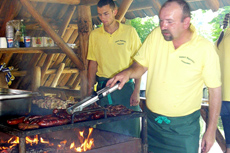 | There is also time to sample products from all over the country. After a glass of beer and a bite of grilled food, one can cherish the flavour of delicious bread from eastern Poland and Lithuania. |
One could also buy for a loved person a gingerbread heart produced by Dagmar Lachmanova.
Fine weather and good moods made this year Besiada another successful event.
